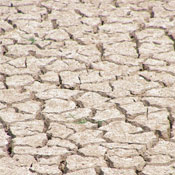Climate Change
Events:
COP17,
28. Nov-9. Dec, 2011
in Durban, South Africa
COP16, 2010 in Cancún, Mexico
COP15, 2009
in Copenhagen, Denmark

Current activities and events:
The second Climate Change Researcher's Day - "Climate Change Impact, Adaptation and Mitigation". November 15th, 2011. Programme
Bonn 2011 Nexus Conference - "The Water Energy and Food Security Nexus – Solutions for the Green Economy". November 16th to 18th 2011. Read more
Southern Africa Climate Change Network SACCNET. Read more
Relevant Climate websites
- IPCC website
- IWA website
- Global Water Footprints and Virtual Water
- Climate Institute
- SciDevNet
- Climate Portal (in Danish)
Reports, Presentations & Summaries:
- Danish Energy Strategy - towards 2050, 2011
-
Climate
Change Adaptation - Linking Policies and Practice, 2010
Sponsored by Climate Change Task Force and the Danish Foreign Ministry -
Researchers´ Day: Climate Change Impact, Adaptation and
Mitigation, 2010
Initiative by the Climate Change Task Force - European Regional Document for the 5. World Water Forum in Istanbul on Adaptation to Climate Change in Europe and Climate Change, Water and Energy, 2009
- Copenmind, 2008
Energy and Water Footprints - linking water management, sustainable development and energy consumption. - Danish Climate Adjustment Strategy, 2008 (in Danish)
- IPCC 6th Technical Paper on Climate Change & Water, 2008
-
Our climate, our children, our responsibility
UNICEF 2008 - COP 13, 2007, in Bali, Indonesia
- Climate Change: the cost of inaction and the cost of adaptation new European Environment Agency (EEA) 2007
- IPCC 4th Assessment Report on Climate Change, 2007
- Green paper: "Adaptation to climate change in Europe - options for EU action" here. On 29 June 2007 the European Commission adopted its first policy document on adapting to the impacts of climate change. For more information about EU and climate changes, read here.
- Sterns Review Report on the economic impacts of climate change 2006
Climate changes have huge impacts on water resources, in terms of changed water balances. This is reflected through changes in water quantity and quality as well as altered patterns in frequency and severity of rainfall, floods and droughts. Combined with rise in sea level and increased sea temperatures the coastal environments are particularly vulnerable to changes. The International Panel on Climate Change (IPCC) has collected climate data since 1970 demonstrating that the anthropogenic climate change influenced many physical and biological systems. Findings include:
- In temperate areas and some warm tropic areas water availability will increase (wet getting wetter)
- Water availability will decrease in the many of the dry areas if the World (dry getting drier)
- Floods will become more frequent and serious, and droughts generally longer, the latter resulting in serious reductions and limitations in food production
- Seasons are changing, reflected through earlier spring in many regions
- Water temperature in rivers and lakes are increasing, affecting water quality and local ecosystems
- Water storage in ice caps, glaciers and snow cover is decreasing. One effect is that the poles are melting, but this has also serious consequences for the one sixth of the global population living in areas with water supplied from snowmelt from major mountain ranges
Main Areas of Focus
Four main "hot spots" in respect to impacts on the water regime are
- Africa south of Sahara
- The large coastal cities
- The mega deltas of Asia
- The small island states
The main aim for Danish Water Forum is to:
- Promote that the water impact of climate change, and the adaptation to such impacts, is high on the Danish and international political agenda.
- Contribute to the branding of the Danish water sector as an internationally leading force in addressing water and climate issues
- Focus on consequences for poor people in developing countries and their possibilities to adapt to climate changes, not least through our Danida "Knowledge Network on Water and Development"
- Participate in major activities related to water and climate change
- Cooperate with relevant partners, including other Danida knowledge networks. Present relevant information about and links to knowledge about water, development and climate change



